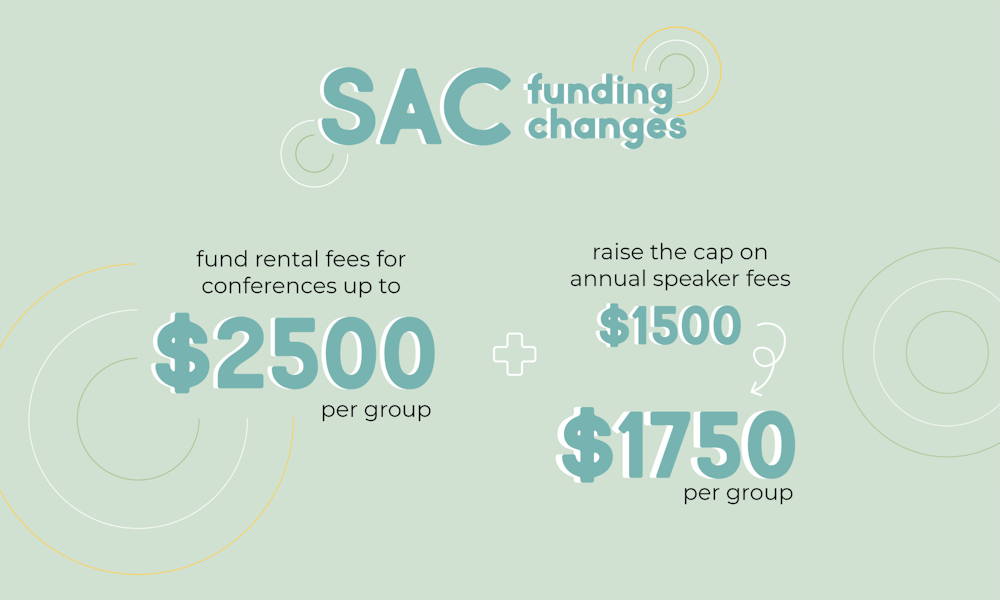The Student Activities Council will fund rental fees for groups that hold on-campus conferences for the first time beginning in fall 2020.
Former SAC Vice President and College senior Elena Hoffman said that SAC will fund space rental fees for conferences up to $2,500 per group for the 2020-2021 academic year. Hoffman added that SAC will also raise the cap on annual speaker fees from $1,500 to $1,750 per group.
Hoffman said, however, that SAC, a student government branch that recognizes and funds student organizations on campus, will not fund every group requesting on-campus rental space funds. Only groups who have successfully held on-campus conferences in the past will receive funding, Hoffman added.
In previous discussions between the Undergraduate Assembly budget committee and SAC, members had proposed using some of the $1.1 million reserve, or “dark,” fund as a one-time expenditure to allow SAC to fund the rental fees. The reserve fund is a University account that holds student groups’ revenue and unused funds from previous years’ budgets. Instead of using the "dark" fund, SAC will use money from its own budget.
Hoffman, who serves on the UA budget committee, said SAC leaders and UA budget committee members decided to use the increased funds from SAC’s annual budget to fund the guideline changes. SAC’s proposed budget for next school year includes an approximately $30,000 increase, 2.18% more than last year’s budget. UA Treasurer and College junior Kevin Zhou said the UA will vote to approve the budget on Feb. 23.
"[SAC's budget] is way better than [money] coming out of the reserve, because you get the allocation every year," Zhou said.
Zhou added that SAC currently covers on-campus space rentals but not large conferences for outside visitors, such as Penn Debate Society's annual high school tournament hosted in Williams Hall and Huntsman Hall.
Zhou added that facility costs are one of the biggest expenses for which SAC allocates money every year, and SAC has been meeting with the UA budget committee and the Office of Student Affairs to discuss how to cover more of these costs.
RELATED:
UA and SAC consider using surplus funds for student group on-campus space rentals
UA drafts proposal to provide free chest binders for transgender students
UA fills vacant Nursing seat with special election – but only 17 people voted
Hoffman said SAC has not covered the costs of these conferences in the past, because of the expense to SAC. She added that student groups often generate revenue through the conferences that can be used for rental fees.
Beyond Arrests: Re-Thinking Systematic Oppression Vice President and College senior Jordan Andrews said that BARS will host its first on-campus conference on Feb. 22. While the rooms they booked in Houston Hall and Irvine Auditorium were free through Vice Provost of University Life, Andrews said that BARS plans to apply for funding next year to cover costs related to space rentals, including microphones and furniture.
Andrews said BARS would benefit from the cap raise on speaker fees. BARS has invited Cyntoia Brown-Long, a criminal justice reform advocate, to be the keynote speaker for their upcoming conference. Andrews said that BARS received SAC contingency funding to pay Brown-Long but added that BARS will apply next year for the increased funds to bring in more high profile speakers in the future. Contingency funding is money from a SAC reserve that groups can apply for in the case of unforeseen costs.
Hoffman said that SAC may increase the speaker fees cap by more in the future but does not want to increase their cap by too much at once.
“We usually roll out these increases slowly just to ensure that we don't overwhelm ourselves,” Hoffman said. “We want to stay conservative.”
Penn Debate Society President and Wharton sophomore Shreyoshi Das said the new guidelines will help Penn Debate Society cover rental fees for their annual high school tournament. She added that the current rental fees limit Debate Society’s ability to use their tournament revenue to send more members to travel and compete.
Das said she estimates that the $2,500 towards rental fees will reduce Debate Society’s costs by approximately 20 to 30%.
“Even if any part of those costs were covered, it’s still a benefit,” Das said.









